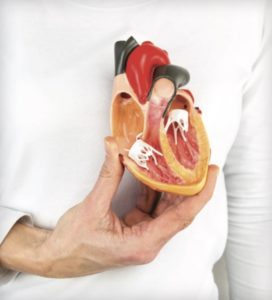Women and Heart Attacks | by

For women, symptoms can be more than chest pain
When women are having a heart attack they need to take action and do it fast. That’s why medical experts want women to know heart attack symptoms for women can be broader than just the “classic” chest pains.
For Deborah Kupecz, it was nausea and a squeezing pain between her shoulder blades that sent her to the emergency room four years ago at the age of 62. That morning she woke up and wasn’t feeling quite right, but she pressed on with her regular routine and went to work. By lunchtime she was back at home for rest, and soon after, at the ER because her symptoms worsened.
“Everything felt bad all over. I couldn’t concentrate. I couldn’t eat,” Kupecz says. Over the next day, medical experts determined that Kupecz had had a coronary artery spasm. “That’s a precursor to a heart attack,” Kupecz says.
The Symptoms

Dr. Bridget Beck
Shortness of breath, nausea, vomiting, fatigue, or pain in the back, jaw and neck — whether alone, a combination of, or in part with chest pain — can signal that a heart attack is impending, says Dr. Bridget Beck, a cardiologist with Denver Heart at Rose Medical Center. Women need to be alert to any kind of chest discomfort that creates bad sensations and these atypical symptoms.
A heart attack occurs when blood flow to the heart is severely reduced or cut off completely. Beck reports evidence shows chest pain is still the most common signal of a heart attack for both women and men, and women are more likely than men to experience other symptoms.
Health professionals want more women to know the symptoms so they can get medical attention sooner. “The longer the artery is blocked, it does more damage to your heart,” Beck says. Kupecz, who is also a nurse, says Beck was instrumental in her diagnosis.
Not only do women delay going to the hospital, says Dr. Sam Aznaurov, a cardiologist with Aurora Denver Cardiology Associates at Presbyterian/St. Luke’s Medical Center, many women’s diagnosis is often delayed.
“Since the predominant symptoms for women may be different, it may send healthcare providers on a tangent,” Aznaurov says. “A significant proportion of women report chest pain as a secondary symptom and usually have more than one complaint.”

Dr. Sam Aznaurov
For Gail Dontenville, 72, her heart attack in the spring of 2017 (while she lived in Arkansas), was preceded by shortness of breath, fatigue and stress but she did not have concerning chest pain. She also had some dizzy spells, nausea and lightheadedness, but attributed those symptoms to her diabetes.
“The week before my heart attack, I was in really bad shape,” Dontenville says. “I also had a really bad cough.” She was diagnosed with pneumonia and sent home. Hours later she was back in the emergency room, where she had a heart attack and was revived three times. “I had a total blockage in my heart,” she says.
Other Things to Know
What should you do if you experience symptoms? “Use common sense. Call your doctor if your symptoms are kind of bugging you and you don’t feel quite right,” Aznaurov says. “If the symptoms are more sudden or severe or accelerate, go to the emergency room.”
“Take two baby aspirin if a heart attack is your concern,” Beck says. “But the most important thing to do is to get to the ER.” Call 911 because time matters. She says it might seem like overkill, but if something should happen on your way to the hospital, the people in the ambulance can help you.
Diagnosis

- An electrocardiogram – an EKG is a non-invasive test that measures whether the electrical activity of the heart is normal, slow, fast or irregular. “In the setting of a heart attack, we’re actually looking for characteristic changes that suggest decreased blood flow to the heart,” Beck says.
- Troponin blood tests – they measure the levels of troponin proteins in the blood – if present, the heart muscle has been damaged. The greater the amount of troponin indicates more damage. It usually takes about six hours to see evidence of a heart attack. So, if the first test is negative, doctors will usually keep a patient longer and sometimes overnight for additional testing, Beck says.
- Cardiac catheterization/angiogram – with this procedure a contrast fluid is injected in a blood vessel or heart chamber to create an X-ray to show blood flow patterns in the heart.
- Stress test – a treadmill test is generally done after doctors have ruled out an immediate heart attack, Beck says. Stress tests with imaging like echo or nuclear pictures are more accurate in women as opposed to a simple treadmill test, which has high rate of false positives in women. Note, the type of stress test available to you may be influenced by insurance.
Beck says one more important point when it comes to heart health: Advocate for yourself. If you feel something is still wrong, ask to be referred to a cardiologist.
“The ER treats life threatening emergencies. Your test results could be negative and you could be sent home, but there could still be a problem (that isn’t imminently life threatening) so chase it a little to get an answer,” Beck says. “If it doesn’t feel right. Get a second opinion and keep looking for answers.”
Be Proactive Now
Aznaurov’s advise to women: Be aware of your heart risk before it happens. “See your primary care physician,” he says. “If you have an abnormal family history, diabetes, hypertension, are sedentary, obese or use tobacco, you are more at risk and need to alter your lifestyle.”
Tags: Heart, Presbyterian/Saint Luke's Medical Center, Rose Medical Center
Leave a Comment
Please be respectful while leaving comments. All comments are subject to removal by the moderator.
